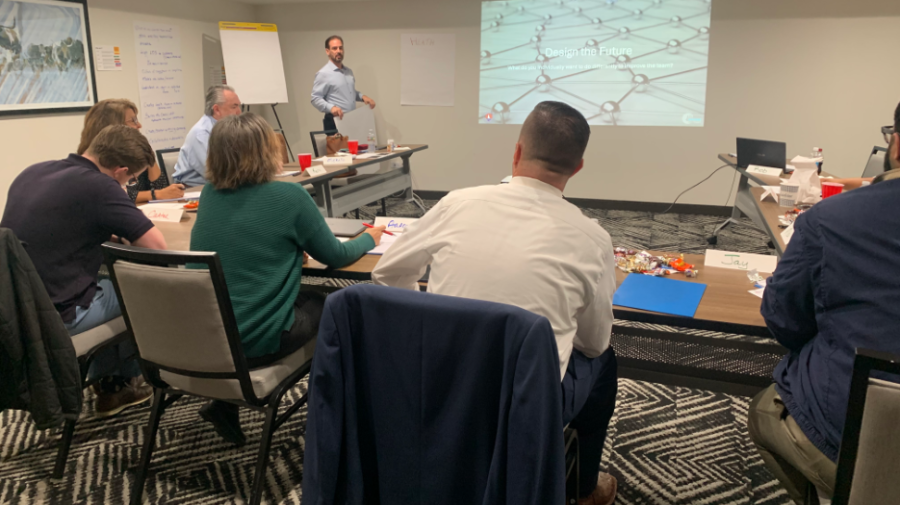
Getting Out of the Way
Commitment to Succession Planning: A Case Study
“All City Manager tenures come to an end. Will you be told to leave or choose the right time to get out of the way?”
Rob Duncan, Managing Director of Imagine That Performance
Identifying and Supporting Future Leaders
Here is the scene. I have been assigned by the City Manager to coordinate the process of hiring a new Leisure Services Director, following the retirement of a very effective, highly skilled predecessor. The assignment was clear…. select an interview committee, review all applications, interview candidates and provide the manager with a list of six to choose from. The Manager would then decide how many of those six to interview before making his final decision and offer.
After completing my task, I provided the City Manager with a list of six names, and proceeded to say to him, “this is the easiest decision you are ever going to have to make.” That is how sure I was that we found the perfect candidate. In fact, after our initial interview with her, I told my interview team, “That is how it is done.”
After meeting with several from the list, the City Manager absolutely agreed with me, and as a result, not only did we get an excellent candidate to become the new Leisure Services Director, but she is also now the City Manager.
Collaborative Strategies for Navigating Political Pathways
After the process mentioned above, I became the City Manager. As part of our budget process starting with the year I became the City Manager, the Council finally approved a new position that we had been seeking for a few years. The Assistant City Manager position was long overdue, and it was finally authorized. There was a political story behind why it hadn’t been approved prior to that point, but the bottom line was now that I had the position and the authority to fill it. Because I was a Finance guy (for most of my career), I did not fill it right away, hoping to save some money, and in part not wanting to hire someone until I got my legs under me as the new City Manager.
In February 2018, I was meeting with the now retired Manager on a weekly basis, and the subject of the new position came up. I had been thinking about it for a while, knowing that I would need help eventually. Also, my tendency, right or wrong, was traditionally to favor internal candidates for promotions. This subject could be a good topic for a City Manager and County Administrator Think Tank session. After all, I was promoted to become the City Manager as an internal candidate as well, after eighteen years of service to the organization in a couple of prior capacities. I thought it worked well…. you know, succession planning in action!
From Rising Star to Leadership: Nurturing Internal Talent
As I began to deliberate about possible candidates, our recently hired new Leisure Services Director kept popping into my mind. In less than one year, she single-handedly re-organized the entire Leisure Services Department, drastically increased their accountability and productivity, and best of all (in my mind anyway), her subordinates liked her! Up to that point, I had never been to a celebratory or holiday event in that department where employees seemed like they were having a good time, and suddenly, even that changed! This really caught my eye, since my years of experience oftentimes taught me how difficult it was to be a responsible supervisor without correspondingly being unpopular (another Think Tank subject, for sure!). The two always seemed to go hand in hand, or so I thought.
It eventually stuck with me that I had someone very special on my hands. To that end, I asked the former Manager whether he thought this new Director would be a good candidate for the Assistant City Manager position. He replied, “she would be a GREAT candidate.” With that affirmation, I promoted her to Assistant City Manager.
Over the course of the next four years, I appreciated her skills, more and more. I had a superstar on my team. Almost perfectly qualified for the position, partially for how her certifications and skill-set complemented mine. Her daily performance was just incredible, which made her more valuable still. Totally professional in appearance, demeanor, and behavior, all the time. The list of her strengths just kept growing, a fact that I discovered mostly because the list of my weaknesses as the City Manager also grew, simultaneously. I was spoiled by her performance at every turn. It was readily becoming evident, to me anyway, that she might be better suited to be the City Manager than I was. One might think that was a sobering thought, but it didn’t strike me that way, because I felt like I deserved some credit for finding this gem, and for being smart enough to promote her to a position that greatly benefited the organization, not just me.
The organizational environment I inherited was historically positive. In fact, because of the skills of the retired City Manager and the cohesive nature of prior Councils, that changed my mind about pursuing the position. As part of the strategic planning process, each year the Staff and Council would meet to spend an entire day discussing achievements, capital projects and Council priorities for the organization to execute in the future. One topic that traditionally would arise was always “Succession Planning.” The process of identifying future leaders for the organization, to ensure a smooth and seamless transition, as current leaders either retire or move on. It isn’t a science as much as an art, but the importance of planning for it cannot be overestimated.
Guiding Leadership Transition: Open Conversations with the Council
Once I got my Assistant City Manager on board, it became more and more evident that she would be perfect for my job. Anyone who has been around her professionally will attest. So, at every opportunity in discussions with Council wherever appropriate, I assertively told them what I thought about how best to replace me when the time came. Let’s face it, I think we all knew that this position would be my last for the city, even though we didn’t know how long that would be.
Being concerned for the organization and what was best for it, I started to think that maybe my tenure should be shorter than originally planned (five years was the target I set for myself), largely because I didn’t want to lose this rising star to any other organization. I really felt like I knew what was best, because I had been in senior management for so long.
The adventures of being in the public eye became the icing on the cake for me in deciding the timing of my decision to get out of the way. There was no guarantee that the Council would select my ACM to replace me, but I was confident that they had been convinced, and I think they were, as evidenced by the fact that she is now the City Manager. It is impossible to overstate how skilled and exceptional she is at everything the job requires. It may not even be possible to convince outsiders, who don’t really understand exactly what goes into running a city.
Assisting Council with Succession Insights: Shaping Leadership for Tomorrow
I initiated the process that led to my retirement. No Council member asked me to leave, and they graciously helped me navigate my way to the pasture. They also intelligently realized that the Assistant City Manager was the right person to take the reins.
Whether anyone believes me or not, doesn’t really matter. In team sports, one of the biggest lessons you learn is that NO ONE is bigger than the team, or the sport itself. Ultimately, I saw this the same way. As the Chief Administrative Officer, it was my job to do what was best for City, always. It became more than evident that promoting the Assistant City Manager to succeed me was best for the organization. While I didn’t control whether that ultimately would happen (it did), the only part I could control was when to get out of the way.
Rarely does Succession Planning work as originally considered. And while I would love to be known for a multitude of community achievements during my tenure (there were a few), the thing that history may remember me most kindly for is knowing when to get out of the way!
After over a year of her leadership, I’m very comfortable in saying that this was a great move for the community and the organization. I cannot imagine a smoother transition having occurred, and that fact soothes me greatly. For another one of my many annoying personal habits (just ask my wife) …. I like to be right!
And with many thanks to the Councils that I served as Manager, especially the two former Mayors ……we GOT IT RIGHT!!!!!
Related Articles That Might
Interest You

Elevating Organizational Culture: From Rules to Standards

Success Story: City of Heath’s Leadership Team Development

Local Government Leadership Questions

Leadership Excellence in Local Government

Enhancing Leadership and Internal Promotion in Local Government

